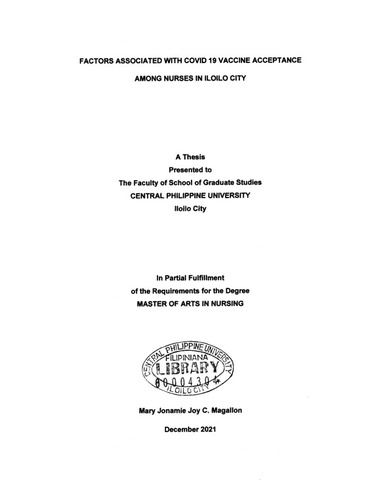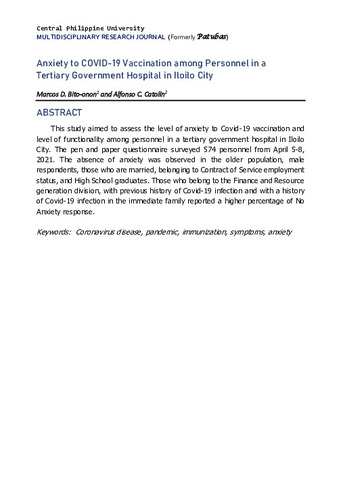Factors associated with COVID 19 vaccine acceptance among nurses in Iloilo City
| dc.contributor.adviser | Porque, Gelbert Jan S. | |
| dc.contributor.author | Magallon, Mary Jonamie Joy C. | |
| dc.coverage.spatial | Iloilo | en_US |
| dc.date.accessioned | 2022-06-27T07:00:57Z | |
| dc.date.available | 2022-06-27T07:00:57Z | |
| dc.date.issued | 2021 | |
| dc.identifier.citation | Magallon, M. J. J. C. (2021). Factors associated with COVID 19 vaccine acceptance among nurses in Iloilo City (Unpublished Master’s thesis). Central Philippine University, Jaro, Iloilo City. | en_US |
| dc.identifier.uri | https://hdl.handle.net/20.500.12852/2111 | |
| dc.description | Abstract only | en_US |
| dc.description.abstract | Immunity is seen as a long-term strategy to address the effects of the COVID-19 pandemic globally. With the varied types of vaccine available, this study was conducted to determine the acceptance of COVID-19 vaccine among nurses in Iloilo City. It also determined the correlation between the characteristics (age, sex, presence of dependent), knowledge about vaccine, level of confidence and level of susceptibility to the acceptance of the vaccine. This descriptive-relational study, conducted in June-July 2021, used the one-shot survey design. The respondents were staff nurses in a private secondary hospital in Iloilo (n = 92). The level of susceptibility was determined using an adopted questionnaire from WHO. The level of knowledge and confidence were determined using a researcher-developed questionnaire. The respondents were asked whether they will get the COVID-19 vaccine available to them. Gamma and Phi were used to test for relationship at 0.05 level of significance. The study was approved by the CPU Research Ethics Committee. Majority of the nurses are middle-aged (30-49), female, and live with their dependents. Most score above 60% on their knowledge about COVID-19 vaccines. About two-fifths have high-risk if susceptibility to COVID. Although majority are highly confident about the COVID-19 vaccine, about 40% have low confidence about it. Majority would accept the vaccine (83%) while 15% plan to delay it and 2% claims to refuse the vaccine. The characteristics, knowledge, confidence, and susceptibility had no influence on the vaccine acceptance. As frontline workers, nurses’ safety should be of prime concern. Healthcare leaders must consider counselling nurses who are hesitant to vaccination. Future researchers can explore other factors associated with hesitancy. Although nurses are working in the frontline, there are nurses who are still doubtful of undergoing vaccination. Programs must be designed by the hospital administration to investigate the cause and ensure compliance. | en_US |
| dc.format.extent | xii, 89 leaves | en_US |
| dc.language.iso | en | en_US |
| dc.subject.ddc | GSL Theses 610.73072 M270 | en_US |
| dc.subject.lcsh | COVID-19 (Disease) | en_US |
| dc.subject.lcsh | COVID-19 (Disease)--Vaccination | en_US |
| dc.subject.lcsh | Vaccine hesitancy | en_US |
| dc.subject.lcsh | Vaccines | en_US |
| dc.subject.lcsh | Vaccination | en_US |
| dc.subject.lcsh | Nurses | en_US |
| dc.subject.lcsh | Philippines--Iloilo | en_US |
| dc.subject.lcsh | COVID-19 vaccines | en_US |
| dc.subject.mesh | Vaccination Hesitancy | en_US |
| dc.subject.mesh | Vaccination | en_US |
| dc.subject.mesh | Nurses | en_US |
| dc.subject.mesh | COVID-19 | en_US |
| dc.subject.mesh | COVID-19 Vaccines | en_US |
| dc.title | Factors associated with COVID 19 vaccine acceptance among nurses in Iloilo City | en_US |
| dc.type | Thesis | en_US |
| dcterms.accessRights | Not publicly accessible | en_US |
| dc.description.bibliographicalreferences | Includes bibliographical references | en_US |
| dc.contributor.chair | Duller, Sarla F. | |
| dc.contributor.committeemember | Canaman, Tony Ray A. | |
| dc.contributor.committeemember | Borlado, Herme A. | |
| dc.contributor.committeemember | Jalandoni, Patrick Joseph B. | |
| dc.contributor.department | School of Graduate Studies | en_US |
| dc.description.degree | Master of Arts in Nursing | en_US |
| local.subject | Vaccine hesitancy | en_US |
| local.subject | Vaccination acceptance | en_US |
| local.subject | Registered nurses | en_US |





